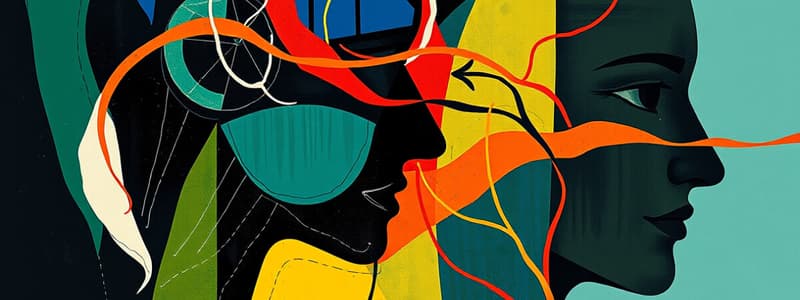Podcast
Questions and Answers
What does Classic Strain Theory primarily explain?
What does Classic Strain Theory primarily explain?
- The role of labeling in deviance
- Ecological differences in society
- Conflicts between legitimate goals and means to achieve them (correct)
- The formation of social bonds
Which theory emphasizes the role of social bonds in maintaining societal values?
Which theory emphasizes the role of social bonds in maintaining societal values?
- Subcultural Theory
- Social Bonds Theory (correct)
- Neutralization Theory
- Labeling Theory
What is a key concept of Labeling Theory?
What is a key concept of Labeling Theory?
- The formation of criminal subcultures
- The ecological perspective on society
- The impact of societal labels on individual behavior (correct)
- The use of justifications by delinquents
Which of the following pillars does the Philippine Criminal Justice System include?
Which of the following pillars does the Philippine Criminal Justice System include?
Which somatotype is characterized as rounded and is known as viscerotonic?
Which somatotype is characterized as rounded and is known as viscerotonic?
What is the main focus of Subcultural Theory?
What is the main focus of Subcultural Theory?
What did Raffaele Garofalo define as a crime?
What did Raffaele Garofalo define as a crime?
Which theory is associated with Earnest Albert Hooton?
Which theory is associated with Earnest Albert Hooton?
What are 'mala in se' crimes characterized by?
What are 'mala in se' crimes characterized by?
What aspect does Sigmund Freud's Psycho-dynamic theory focus on?
What aspect does Sigmund Freud's Psycho-dynamic theory focus on?
What does Albert Bandura's Social Learning Theory emphasize?
What does Albert Bandura's Social Learning Theory emphasize?
Which term describes the state of normlessness as defined by Emile Durkheim?
Which term describes the state of normlessness as defined by Emile Durkheim?
According to Edwin Sutherland's Differential Association theory, how do individuals learn criminal behavior?
According to Edwin Sutherland's Differential Association theory, how do individuals learn criminal behavior?
What does Sociological Positivism rely on to study society?
What does Sociological Positivism rely on to study society?
Which function of crime is related to establishing boundaries of acceptable behavior?
Which function of crime is related to establishing boundaries of acceptable behavior?
What is the primary focus of criminology?
What is the primary focus of criminology?
Which branch of criminology focuses on theories of crime causation?
Which branch of criminology focuses on theories of crime causation?
What aspect does the study of criminal statistics primarily address?
What aspect does the study of criminal statistics primarily address?
What is a key benefit of studying criminology?
What is a key benefit of studying criminology?
Which of the following is considered a dynamic aspect of criminology?
Which of the following is considered a dynamic aspect of criminology?
What is the primary focus of criminalistics?
What is the primary focus of criminalistics?
Which branch of forensic science studies human remains?
Which branch of forensic science studies human remains?
What theory is central to the Classical School of Criminology?
What theory is central to the Classical School of Criminology?
Who is recognized as the Father of Criminal Justice?
Who is recognized as the Father of Criminal Justice?
Which philosophical concept did Jeremy Bentham promote?
Which philosophical concept did Jeremy Bentham promote?
What does the Positivist School of Criminology focus on?
What does the Positivist School of Criminology focus on?
What concept did Cesare Lombroso associate with his theory of Atavistic Man?
What concept did Cesare Lombroso associate with his theory of Atavistic Man?
What does Biological Positivism emphasize?
What does Biological Positivism emphasize?
What did William Herbert Sheldon contribute to the field of criminology?
What did William Herbert Sheldon contribute to the field of criminology?
What is considered a stigma according to Lombroso's theory?
What is considered a stigma according to Lombroso's theory?
Flashcards are hidden until you start studying
Study Notes
Classic Strain Theory
- Developed by Robert K. Merton, this theory identifies a disconnect between socially accepted goals and the means to achieve them.
Social Bonds Theory
- Proposed by Travis Hirschi, the theory emphasizes the role of social bonds in promoting shared values within a community.
Chicago School of Sociology
- A movement involving faculty and students that focused on the social aspects of urban life and various sociological issues.
Societal Disorganization
- A theoretical perspective that seeks to explain variations in social structures across different ecological settings.
Labeling Theory
- Introduced by Howard Becker, this theory examines how societal labels influence individuals’ behaviors, particularly regarding deviance.
Subcultural Theory
- Formulated by Albert Cohen, it posits that crime emerges from specific criminal subcultures that have their own values and norms.
Neutralization Theory
- Developed by Gresham M. Sykes, this theory explains how delinquents rationalize their actions through justifications that diminish their sense of guilt.
Philippine Criminal Justice System
- Comprises four pillars: law enforcement, courts, correction, and community. It operates under a mystique that often rationalizes criminal behavior.
John Bowlby: Attachment Theory
- Focuses on the importance of relationships in child development and the psychological consequences of attachment.
Albert Bandura: Social Learning Theory
- Conducted the "Bobo doll" experiment showing that children imitate behavior observed in others, emphasizing observational learning.
Edwin Sutherland: Differential Association Theory
- Suggests that criminal behavior is learned through interactions and relationships with others.
Sociological Positivism
- Relies on empirical evidence from experiments and statistics, linking social phenomena with concrete laws.
Emile Durkheim: Anomie and Functionalism
- Anomie refers to a state of normlessness in society, while functionalism emphasizes the role of institutions in maintaining social order.
Functions of Crime
- Social regulation, social integration, and facilitating social change are key functions that crime can serve in society.
Somatotypes
- Classification of body types into three categories:
- Endomorphs: round, softer body shape.
- Mesomorphs: muscular and athletic build.
- Ectomorphs: lean and thin physique.
Raffaele Garofalo: Theory of Natural Crime
- An Italian criminologist who viewed crime as a violation of natural law rather than mere legal transgressions.
Mala in Se vs. Mala Prohibita
- Mala in se: Acts considered inherently wrong (e.g., murder).
- Mala prohibita: Acts that are wrong because they are prohibited by law (e.g., drug offenses).
Earnest Albert Hooton: Physical Inferiority Theory
- Explored the relationship between physical traits, human evolution, and crime.
Psychological Positivism
- Investigates how physical attributes and genetics influence behavior, particularly in criminality.
Sigmund Freud: Psycho-Dynamic Theory
- Focuses on the unconscious aspects of the human psyche, including methods of therapy like psychoanalysis.
Forensic Science
- Criminalistics: Investigating crime scenes and analyzing evidence.
- Includes branches such as forensic anthropology, engineering, odontology, pathology, entomology, and toxicology.
Theories of Crime
- Demonological Theory: Attributes evil behavior to demonic possession.
- Classical School of Criminology: Stresses rational choice in committing crimes.
Rational Choice Theory
- A central concept within the Classical School, suggesting that individuals weigh costs and benefits before engaging in criminal behavior.
Penal Reform
- Influential figures include:
- Cesare Beccaria: Known as the father of criminal justice, emphasized rationality in legal reform.
- Jeremy Bentham: Advocated for utilitarianism and the greatest good principle in ethics.
Criminology
- The study of crime as a social phenomenon, including criminals and the penal system.
Importance of Studying Criminology
- Enhances understanding of crime, informs judicial policies, improves practices, aids crime prevention, and promotes social justice.
Nature of Criminology
- An applied social science that evolves to analyze criminal behavior within societal contexts.
Branches of Criminology
- Socio-legal studies, criminal etiology, penology, criminal statistics, criminal psychology, forensic psychology, and victimology.
Positivist School of Criminology
- Emerged in the 19th century, focusing on empirical evidence and scientific inquiry to analyze crime.
Biological Positivism
- Examines inherited characteristics and genetic factors impacting criminal behavior.
Cesare Lombroso: Atavistic Man Theory
- Proposed that criminals are evolutionary throwbacks exhibiting physical and mental anomalies.
Stigmata
- Refers to physical and psychological characteristics common among criminals, such as skull shape and facial features.
William Herbert Sheldon: Somatotyping
- Developed a system to categorize individuals based on their body build, further expanding on the links between physique and personality traits.
Studying That Suits You
Use AI to generate personalized quizzes and flashcards to suit your learning preferences.




